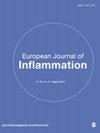CD64 as a diagnostic marker for bacterial infection in acute bronchiolitis
IF 0.8
4区 医学
Q4 IMMUNOLOGY
引用次数: 0
Abstract
Objectives: The aim of this study was to determine the association between neutrophils and monocytes CD 64 molecules and cases of bronchiolitis with an associated bacterial infection. Methods: Blood samples were obtained from patients younger than 2 years old diagnosed with bronchiolitis. Complete blood count (CBC), blood culture, procalcitonin, and CD64 surface expression in neutrophils and monocytes were examined using flow cytometry. We also assessed CBC, procalcitonin, and CD64 levels in neutrophils and monocytes in 31 healthy control subjects. Results: Sixty-two patients with lower respiratory tract infections were included in the first group. The patients were divided into 34 with non-bacterial infections and 28 with possible bacterial infections. We found a significant increase in the number of positive cells in the Mean Fluorescence Intensity (MFI) of both nCD64 and mCD64 in the Possible Bacterial Infection (PBI) group. Procalcitonin levels correlated with nCD64 and nCD64%, but not with mCD64. The AUC of nCD64 was 0.873 (at a cut-off point of 4489.4; the MFI had a specificity of 73% and a sensitivity of 94%). Conclusion: Neutrophil CD64 may be a marker for bacterial infection in children with bronchiolitis.CD64作为急性细支气管炎细菌感染的诊断标志物
目的:本研究的目的是确定中性粒细胞和单核细胞cd64分子与毛细支气管炎合并细菌感染病例之间的关系。方法:对年龄小于2岁的毛细支气管炎患者进行血样采集。流式细胞术检测全血细胞计数(CBC)、血培养、降钙素原和CD64在中性粒细胞和单核细胞中的表面表达。我们还评估了31名健康对照者中性粒细胞和单核细胞中的CBC、降钙素原和CD64水平。结果:第一组62例下呼吸道感染患者。将患者分为非细菌感染34例和可能细菌感染28例。我们发现在可能的细菌感染(PBI)组中,nCD64和mCD64的平均荧光强度(MFI)的阳性细胞数量显著增加。降钙素原水平与nCD64和nCD64%相关,但与mCD64无关。nCD64的AUC为0.873(截止点为4489.4;MFI的特异性为73%,敏感性为94%)。结论:中性粒细胞CD64可能是毛细支气管炎患儿细菌感染的标志。
本文章由计算机程序翻译,如有差异,请以英文原文为准。
求助全文
约1分钟内获得全文
求助全文
来源期刊
CiteScore
0.90
自引率
0.00%
发文量
54
审稿时长
15 weeks
期刊介绍:
European Journal of Inflammation is a multidisciplinary, peer-reviewed, open access journal covering a wide range of topics in inflammation, including immunology, pathology, pharmacology and related general experimental and clinical research.

 求助内容:
求助内容: 应助结果提醒方式:
应助结果提醒方式:


